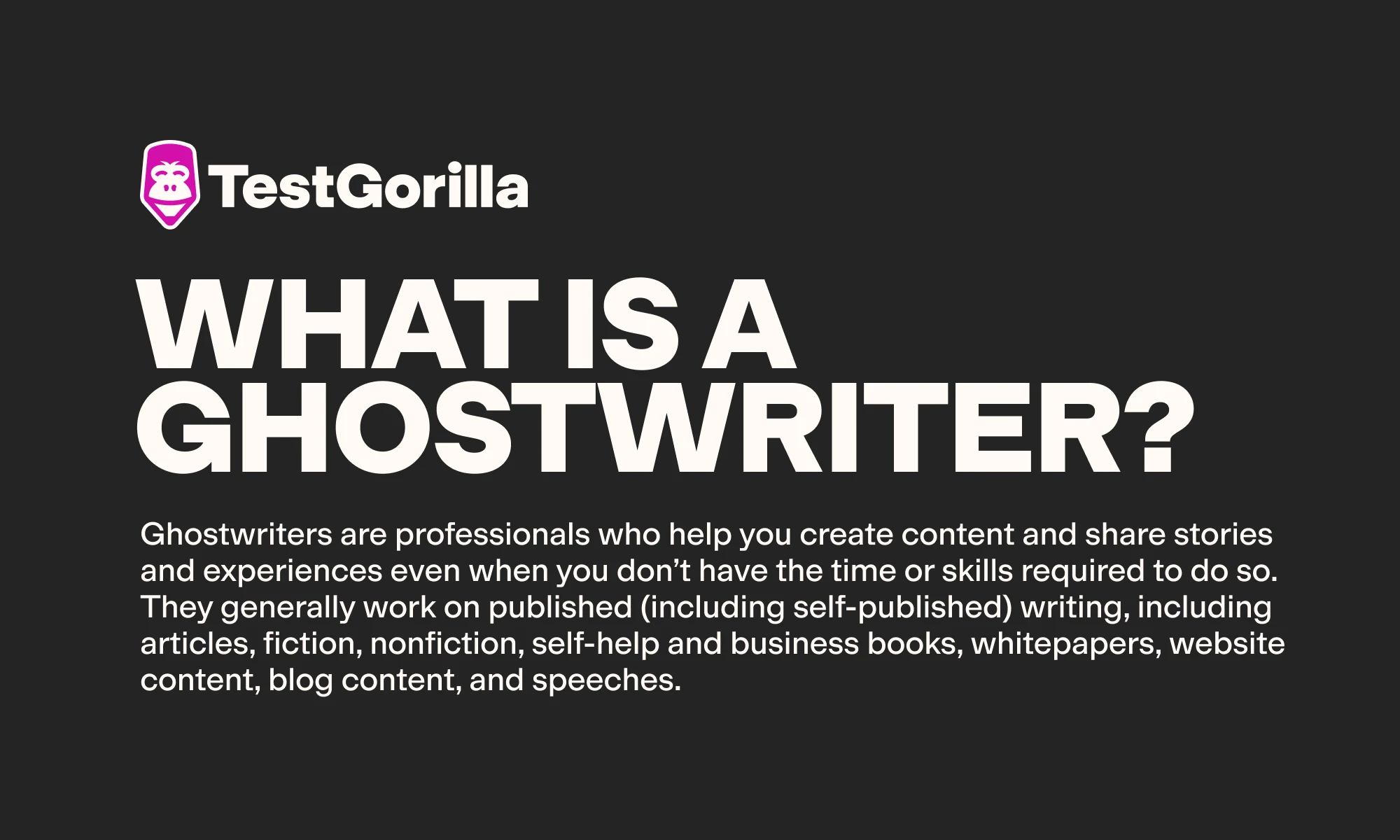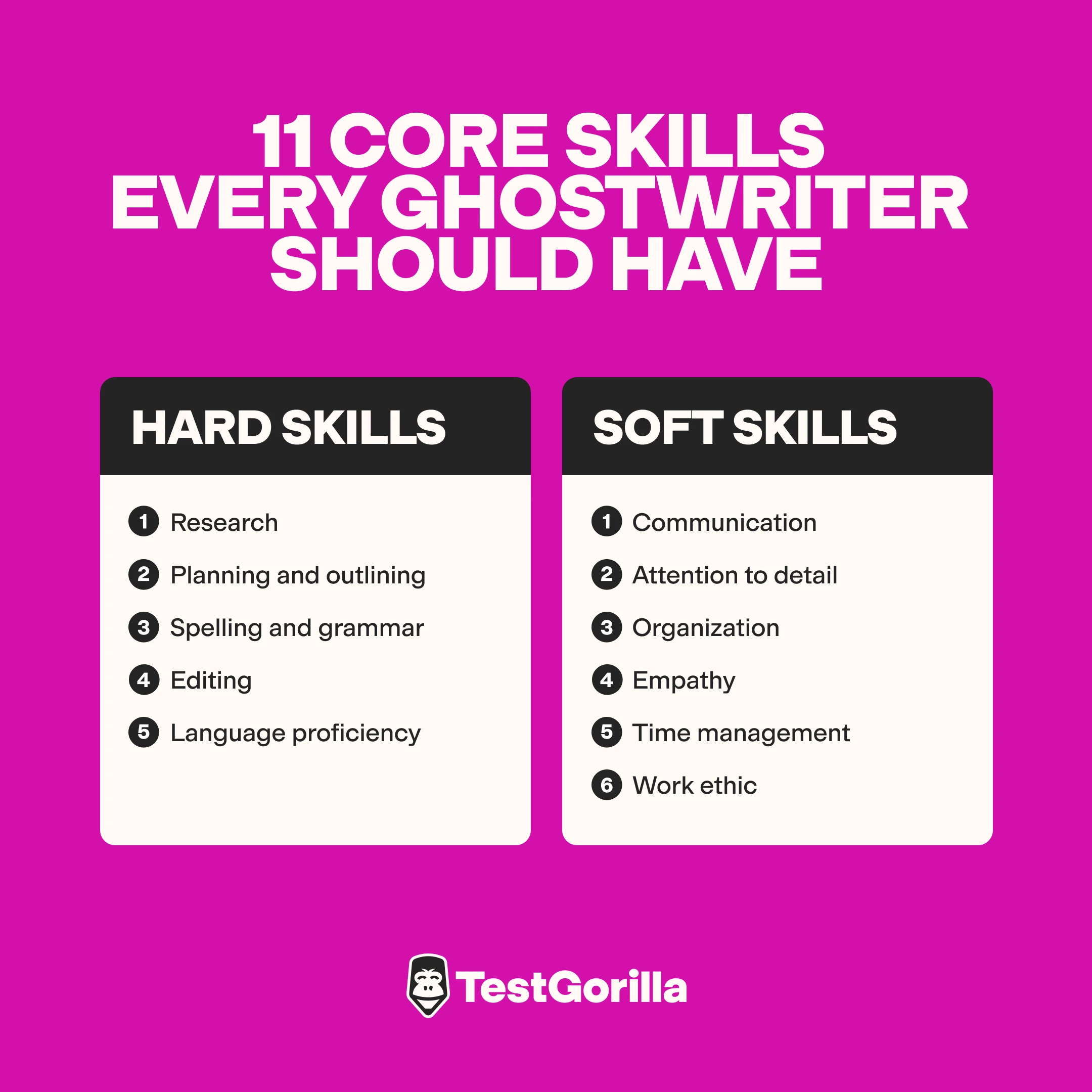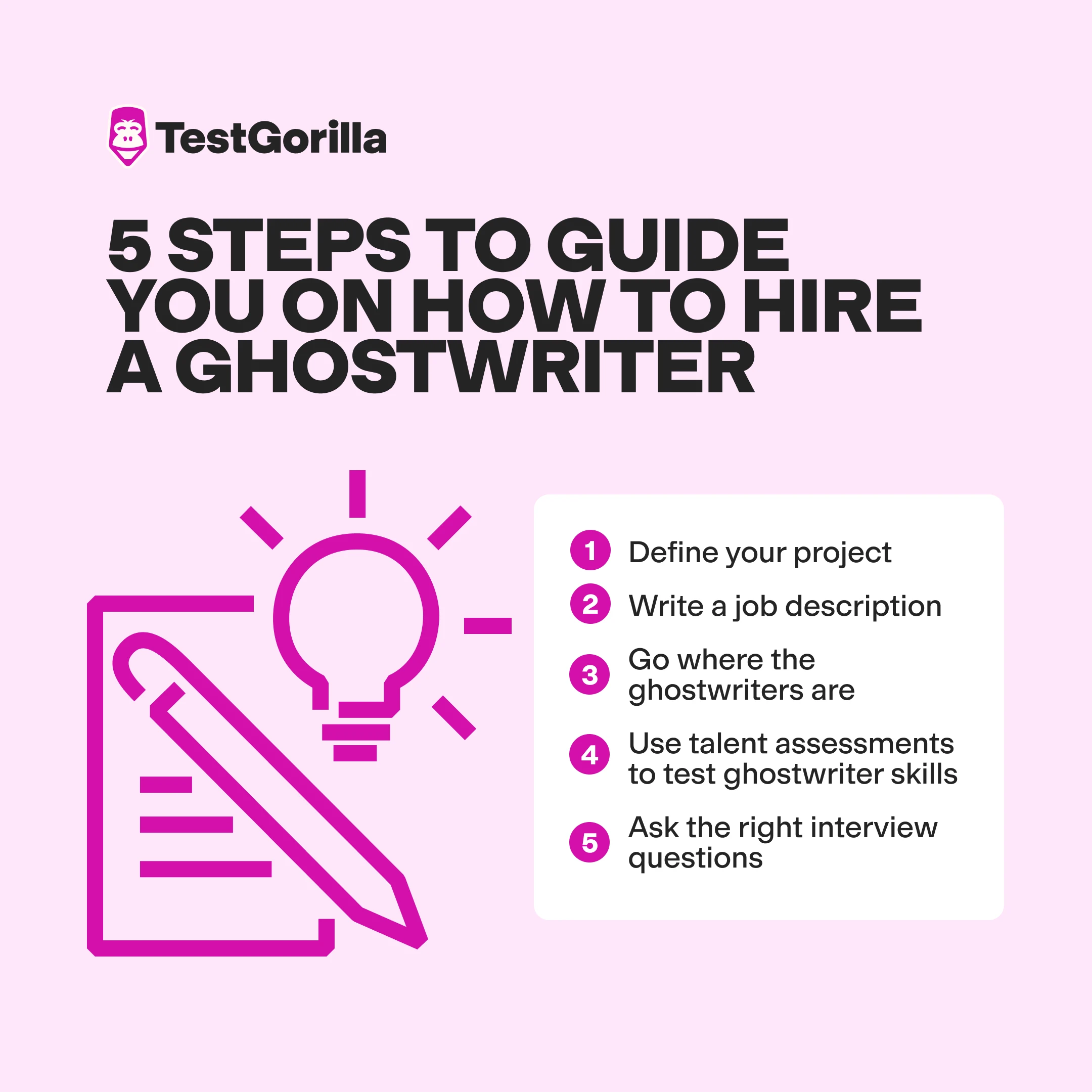Hire the best writers with skills testing
Sometimes, as a professional writer, you don’t have time to finish a book idea, or you might even get writer’s block. You could also be a content marketer overwhelmed by deadlines for blog posts and whitepapers.
Pretty much any profession that involves writing can run into a range of problems where you simply can’t write everything on your own.
Ghostwriters offer a solution to your writing woes.
However, the idea of hiring one may raise several questions for someone who has never done so. How do you find a writer who’s the right fit without going over budget?
In this guide, we explain how to hire a good ghostwriter using a talent discovery platform and skills assessments.
What is a ghostwriter?
Ghostwriters are professionals who help you create content and share stories and experiences even when you don’t have the time or skills required to do so. They generally work on published (including self-published) writing, including articles, fiction, nonfiction, self-help and business books, whitepapers, website content, blog content, and speeches.
Many people are interested in hiring ghostwriters. Here are a few examples:
Public figures who want to publish an autobiography or memoir
People who must send a lot of correspondence messages, like entrepreneurs and consultants
People responsible for giving speeches, like political and academic leaders
People who often give formal press releases, like sports coaches and business owners
Experienced writers who may simply be too burdened by heavy workloads, like novelists, content managers, and podcasters
When hiring a ghostwriter, it’s common practice to hire them as 1099 employees or independent contractors.
Typically, ghostwriters don’t get credited for their work and sign a nondisclosure agreement (NDA). If they do get acknowledged, it’s usually as a co-author, collaborator, researcher, or research assistant at the end of the article or book, but they’re rarely – if ever – acknowledged as the writer of the entire book or other deliverable.
Why hire a professional ghostwriter?
So, how does a company or personal project benefit from hiring a ghostwriter?
Here are four common reasons you want to find ghostwriters for your projects:
1. You have expertise on the topic, but you don’t have writing skills
You’re an expert in your particular field, but you’re not a seasoned writer – what better way to get your message across than by collaborating with a ghostwriter?
They can help you connect with your audience on a personal level and grow your business through a combination of powerful storytelling and proven copywriting techniques.
2. You don’t have enough time
Ghostwriting saves you a lot of time, regardless of the content you’re creating.
Many people interested in authoring books have full-time jobs. Therefore, hiring a book ghostwriter is a valid option to help you finish and turn you into the next bestseller on Amazon.
If you’re a business owner, publishing ghostwritten content is a great way to reach potential customers and build your reputation (i.e., through SEO and social media). Many entrepreneurs collaborate with ghostwriters to generate high-quality content that draws attention to themselves without removing their focus from their core business activities.
3. You want to create lots of content
It's challenging to keep up with the competition when it comes to content. Digital marketing attracts significant investment and helps you develop your brand.
However, the marketing world moves fast, and content marketing requires you to publish dozens of articles monthly, consuming time and energy. A ghostwriter can help you keep up the publishing pace and climb the SERP (search engine landing page) rankings.
4. You don’t have expertise in the required topics
Sometimes, you have an idea that interests you, but you’re not an expert in a particular element of that field and need guidance. Ghostwriters can help.
For example, say you run an architecture blog. You’re an architecture enthusiast, so you normally have no problem writing about the subject. However, one article dives into the topic of zoning laws, which you know little about. This is a great opportunity to outsource the piece to a knowledgeable ghostwriter and ensure your article gets the facts right.
The best insights on HR and recruitment, delivered to your inbox.
Biweekly updates. No spam. Unsubscribe any time.
11 fundamental skills needed for a ghostwriter
Whether you want to hire a content ghostwriter or a nonfiction book ghostwriter, you need to look for the right skills.
To write a story for someone else, ghostwriters must:
Act like journalists, drawing the right information from their clients
Be great researchers, regardless of the topic, so they can fill in missing details
Write compellingly, taking up the voice and writing style of the client
Excel at communication and revisions
Candidate abilities are broken down into hard skills and soft skills. Hard skills are knowledge-based, such as proofreading, while soft skills are non-technical abilities and personality traits, such as attention to detail. The ideal person has the right mix of both, making them a well-rounded fit for your brand and project.
Let’s take a closer look at the skill set you should be hiring for.
Ghostwriter hard skills
Hard skills | Description |
Research | Has the ability to find reliable sources, collect and compare information, interpret data, and include references in content |
Planning and outlining | Visualizes content structure, develops key concepts and themes, and experiments with ideas |
Spelling and grammar | Ensures credibility, readability, and clarity through proper spelling and grammar |
Editing | Improves quality by fixing mistakes, clarifying sentences, adjusting word count, and matching tone and language to the target audience |
Language proficiency | Displays proficiency in speaking, reading, writing, and understanding the nuances of the desired language |
Ghostwriter soft skills
Soft skills | Description |
Communication | Delivers clear messaging, expresses themselves concisely, is able to understand your feedback, and asks the right question |
Reads comprehensively, distinguishing textual details, identifying formatting issues and errors, and ensuring high-quality writing | |
Organization | Can manage brief feedback and research notes, and work from a content outline, increasing productivity |
Empathy | Connects with readers and clients by understanding their perspectives and emotions, building a personal connection through storytelling |
Prioritizes tasks, works according to a schedule, and delivers on time. | |
Work ethic | Works with honesty, integrity, reliability, and accountability, and understands the importance of client confidentiality |
Hire skilled ghostwriters with TestGorilla
Test essential writing skills with our screening assessments and find the best ghostwriters on the market. Learn how to get started from one of our friendly experts.
5 steps on how to hire a ghostwriter
Finding the right candidate for your company can be challenging. It’s all about knowing how to find a prospective ghostwriter with the right combination of skills and mental alignment.
Ghostwriters sign NDAs and are usually not allowed to provide published writing samples of their ghostwriting projects. Because of that, it’s difficult to accurately evaluate their accomplishments and track record, so you may be vulnerable to the promises of scammers.
These five steps guide you on how to find, vet, and hire a professional ghostwriter.
1. Define your project
What do you need to write? Is it a book or a series of blog articles? How long is the writer expected to work for you, and what expertise is required?
Identify the type of work, scope, and budget for your project. These details also come in handy when it comes to negotiating your ghostwriting contracts.
2. Write a job description
Create a job description to use on job boards and websites like Indeed, Monster, and LinkedIn. You can also use the same post for freelance websites such as Upwork and Fiverr.
Be sure to include what the project entails and what skills and qualifications you’re looking for. You can also include details about company culture and values. Not sure where to begin? Start with our simple template:
Ghostwriting job description template
[COMPANY NAME] is looking for a creative and reliable ghostwriter who can write compelling stories about [A FEW DETAILS ABOUT THE PROJECT].
As [COMPANY NAME]’s ghostwriter, you will collaborate with other members of our team to turn our company’s ideas and big-picture concepts into engaging content across [THE CHANNELS YOU USE].
Ghostwriter job requirements
Strong research skills or knowledge in [YOUR SUBJECT OF CHOICE]
Ability to consistently and quickly write quality content
Excellent communication skills
Good teamwork and collaboration skills
Ability to meet tight deadlines in a dynamic work environment
Ghostwriter job responsibilities
Write content in [YOUR COMPANY’S TONE]
Conduct extensive research on the assigned topics
Collaborate with experts to gather information and insight
Fact-check and edit your content
Ghostwriter pay and benefits
[YOUR OFFER]
As always, use job description templates as a guide. Please customize each section to fit your requirements and ensure you attract the right candidates.
3. Go where the ghostwriters are
If you want to find the best applicants, spend time on the same channels and platforms as they do. The platforms listed below host both freelance writers and entire ghostwriting agencies, depending on your preference for working with either individuals or companies.
Where to find a full-time in-house ghostwriter
LinkedIn: You can start the general search here, but be prepared to spend some time researching and collecting info. Many ghostwriters don’t publicly share what they do on their profiles. Posting a job description on LinkedIn attracts ghostwriters.
Google: Sometimes, a simple Google search can do the trick. Look for ghostwriters in your niche – many have their own websites, so searching that way can bear fruit.
Where to find a part-time freelance ghostwriter
Reedsy: It has a large selection of quality ghostwriters and a systematic approach to finding and working with them that solves most issues, such as settling payment terms.
MediaBistro: This platform has a large number of qualified writers split between a wide variety of categories, including fiction writers, social media managers, and SEO specialists.
The American Association of Ghostwriters: This professional organization uplifts its members with webinars, networking, and market guidance, so you’re likely to find higher-quality ghostwriters here.
Upwork: There are many ghostwriter services on Upwork, and the platform gives you tools to view a freelancer’s pricing, testimonials, and writing samples.
Fiverr: Initially famous for its ultra-cheap freelance opportunities, Fiverr has evolved into a massive platform for freelancers of a wide range of price points, skill levels, and specialties, including ghostwriting.
4. Use talent assessments to test ghostwriter skills
Once the applications start rolling in, we recommend you ditch time-consuming resumes and use a talent discovery platform to build a talent assessment that evaluates each of your candidates’ skills objectively and without unconscious bias.
Our ever-growing test library at TestGorilla offers a wide selection of skills tests developed by subject matter experts on hundreds of skills, roles, and tools.
This makes it a breeze to build customized assessments (made up of five short skills tests) for hiring ghostwriters:
We recommend two routes for efficient hiring:
Option 1: Using our pre-built assessment for hiring ghostwriters.
This selection includes the following five tests:
English C2 (Proficient) test - Evaluate every aspect of candidates’ language proficiency – reading, writing, speaking, and listening – to ensure they’re English experts
Time Management test - Find reliable ghostwriters who don’t make excuses and meet deadlines consistently
Attention to Detail (Textual) test - Identify candidates who pay great attention to details and gain insights into their analytical skills
Reading Comprehension test - Assess candidates’ ability to read a portion of text and quickly comprehend its meaning and relevance
Culture Add test - Assess how well your candidates’ values, behaviors, and interests align with your company culture
Option 2: Customizing this pre-built assessment by swapping one or two tests with the following:
A different language proficiency test (i.e., the Spanish C2 test) if you require your writers to work with multiple languages
A Negotiation test if you need writers who can influence and drive the discussion and use emotional intelligence in difficult conversations
A Personality test, such as the Big 5 (OCEAN) test, to learn more about each candidate’s motivation, source of energy, and decision-making process
A Communication test for assessing candidates’ skills in written and verbal communication, as well as in active listening and nonverbal cues
An Understanding Instructions test to gauge how well candidates follow instructions from video meetings, writing briefs, and phone calls
Use TestGorilla to unlock the power of skills assessments
Getting started with TestGorilla is easy and 100% free. All you need to do is sign up and start assessing your next ghostwriters.
5. Ask the right interview questions
Once you screen the initial applicants with a talent assessment, it’s time to interview your most promising candidates.
Interviewing ghostwriters helps you understand their expectations and how they work. It enables you to examine their work ethics and what they stand for.
Here are some sample interview questions you can ask your candidates:
What are the three most important qualities that a ghostwriter should have?
If a client asks you to do something that goes against your values, what would you do?
What inspires you to stay motivated and get creative?
Describe your process for structuring writing.
What are some questions that you ask your clients to understand their story better?
How much does it cost to hire a ghostwriter?
Ghostwriters charge for their services in many different ways, including upfront payment, price per word, or hourly, so it’s difficult to pin down an exact cost.
Reedsy, one of the freelancing platforms mentioned above, estimates that a ghostwriter can cost between $1,500 and $42,000 per book project, depending on its length and genre.
The yearly salary cost to hire an experienced ghostwriter typically ranges from $44,000 to almost $68,000. Freelance ghostwriting rates and fees depend on each project’s scope, complexity, and deadline, so your best bet is to get a few cost estimates and compare them.
Hire your next ghostwriter with a talent discovery platform
Hiring the right ghostwriter pays off with polished content that speaks to your audience. The issue is navigating the wild west of freelance writing and knowing how to hire a ghostwriter for your needs.
You can easily sift the gold from rivers of ghostwriting with TestGorilla. Our talent discovery platform enables you to take a skills-based hiring approach and find the best candidate every time.
Find out what our platform can do for you by signing up for a live demo or taking a product tour.
If you are ready to hire a ghostwriter today, you can try our Free forever plan and start building skills assessments immediately!
How to hire a ghostwriter FAQs
Below are answers to four commonly asked ghostwriter questions – read them to learn more about hiring a writer for your business.
How do you find a reputable ghostwriter?
You can find a reputable ghostwriter by looking on search engines and job sites. Specialist websites for professional writing services may also help you narrow your search. However, it can be a bit of a minefield – that’s why we recommend using talent assessment platforms to test and hire ghostwriters with the skills and personality to fit your project.
Is it ethical to hire a ghostwriter?
Ghostwriting is ethical as long as everyone involved knows what’s going on. The key is knowing how to hire a ghostwriter that fits your business. Contracts should have nondisclosure agreements, established scope, and be signed by all parties before writing begins. Ethical ghostwriting is used by celebrities, published authors, CEOs, content marketers, and various professionals worldwide.
Do ghostwriters get royalties?
Ghostwriters can receive royalties if that is listed as compensation in their contract. However, ghostwriters typically do not receive royalties. All writing is owned by the company or individual that hires the professional ghostwriter.
Do ghostwriters get copyrights?
Ghostwriters do not get the copyright under standard ghostwriting contracts. However, if you do not state that the writer is selling their work to you in exchange for payment, then they own the copyright by default.
You've scrolled this far
Why not try TestGorilla for free, and see what happens when you put skills first.






















